
AQUACULTURE INTERNATIONAL
Scope & Guideline
Elevating Aquatic Research for Global Impact
Introduction
Aims and Scopes
- Sustainable Aquaculture Practices:
The journal emphasizes research that promotes sustainability in aquaculture, including the use of alternative feed sources, integrated multi-trophic aquaculture (IMTA), and environmentally friendly farming techniques. - Health Management and Disease Control:
A significant focus is placed on understanding and managing diseases affecting aquatic species, including the development of vaccines, probiotics, and other therapeutic approaches to enhance fish health. - Nutrition and Feed Formulation:
Research articles often explore dietary formulations, the use of novel feed additives, and the impact of nutrition on growth performance, immune response, and overall health of aquaculture species. - Genetic and Biotechnological Advances:
The journal publishes studies on genetic improvement, breeding strategies, and biotechnological applications in aquaculture, including genomic studies and the use of molecular tools for disease resistance. - Water Quality Management:
Research related to water quality monitoring and management in aquaculture systems is a core area of focus, addressing issues such as nutrient recycling, waste management, and the use of biofloc technology.
Trending and Emerging
- Innovative Use of Probiotics and Synbiotics:
There is a growing trend in research focusing on the application of probiotics and synbiotics to enhance fish health, growth performance, and disease resistance, reflecting a shift towards microbial management in aquaculture. - Nutritional Biostimulants and Feed Alternatives:
Emerging studies are increasingly exploring the use of natural biostimulants, plant extracts, and alternative protein sources in diets, aimed at improving growth and health of aquaculture species. - Aquaculture and Climate Change Adaptation:
Research addressing the impacts of climate change on aquaculture practices, including temperature fluctuations and salinity effects, is becoming more prominent as the industry seeks to adapt to environmental changes. - Integration of Technology in Aquaculture:
The integration of smart technologies, AI, and machine learning for monitoring and optimizing aquaculture practices is trending, showcasing the industry's move towards data-driven management solutions. - Focus on Aquaculture Biosecurity:
There is an increasing emphasis on biosecurity measures, disease prevention strategies, and the development of vaccines to combat emerging pathogens in aquaculture, reflecting a proactive approach to health management.
Declining or Waning
- Traditional Aquaculture Techniques:
There is a noticeable reduction in studies focusing solely on traditional aquaculture methods, as the field shifts towards more innovative and sustainable practices. - Conventional Fish Feed Research:
Research on conventional fish feeds, particularly those relying heavily on fishmeal, is declining, likely due to increasing interest in sustainable and alternative feed sources. - Generalized Health Assessments:
Studies providing general health assessments without specific interventions or innovative approaches have decreased, as more targeted and advanced methodologies gain traction. - Non-Species Specific Research:
There is a waning interest in non-specific research that does not focus on particular species or aquaculture systems, as the field moves towards more specialized and relevant studies.
Similar Journals
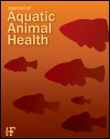
JOURNAL OF AQUATIC ANIMAL HEALTH
Transforming aquatic health knowledge into practice.JOURNAL OF AQUATIC ANIMAL HEALTH, published by Wiley, is a premier scholarly journal dedicated to advancing the field of aquatic animal health. With an ISSN of 0899-7659 and an E-ISSN of 1548-8667, this journal has established itself as a key resource for researchers, professionals, and students involved in aquatic sciences since its inception in 1989. Covering a comprehensive range of topics within aquatic animal health, the journal aims to disseminate significant findings and foster multidisciplinary collaborations. As of 2023, it is ranked in the third quartile (Q3) within the broader category of Aquatic Science, according to Scopus, reflecting its growing influence in the field. Operating without an open access model, the journal maintains stringent standards for publication, ensuring that it remains a respected platform for high-quality research. Located in Hoboken, NJ, the journal is poised to continue contributing vital insights that enhance the understanding and management of aquatic animal health worldwide.
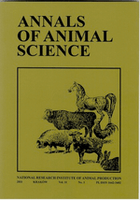
Annals of Animal Science
Fostering Collaboration in Animal Health and ProductionAnnals of Animal Science is a prestigious academic journal, published by Walter de Gruyter GmbH in Germany, specializing in the multifaceted field of Animal Science. With an ISSN of 1642-3402 and an E-ISSN of 2300-8733, this journal is recognized for its high-impact contributions, holding a commendable impact factor that demonstrates its relevance in nurturing quality research. The journal has garnered Q2 rankings in 2023 across various categories including Animal Science and Zoology, Food Animals, and Small Animals. Notably, its Scopus Rankings indicate an elite standing, with the journal placing in the top 10% within its specific fields. Covering converged years from 2008 to 2024, the Annals of Animal Science serves as an essential platform for researchers, professionals, and students to disseminate knowledge and advance studies related to animal health, welfare, and production. The journal also emphasizes open access, promoting broader accessibility to foster collaboration and innovation in Animal Science globally. For those committed to advancing their understanding of veterinary and agricultural sciences, this journal is a vital resource.
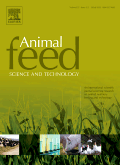
ANIMAL FEED SCIENCE AND TECHNOLOGY
Connecting Research and Practice in Animal Feed ScienceANIMAL FEED SCIENCE AND TECHNOLOGY, published by Elsevier, is a leading journal in the field of Animal Science and Zoology, with an impressive Q1 quartile ranking and a 93rd percentile standing among its peers. Since its inception in 1976, this journal has been at the forefront of disseminating significant research in animal feed formulation, nutritional efficiency, and the technological advancements influencing feed science. With a reputation for high-impact studies, it serves as an essential resource for researchers, professionals, and students dedicated to the optimization of animal nutrition and welfare. The journal's comprehensive coverage of innovative methodologies and findings continues to shape practices in agricultural and biological sciences. For those keen to keep abreast of pivotal developments in the field, ANIMAL FEED SCIENCE AND TECHNOLOGY remains a crucial outlet for scholarly contributions and discussions.

Turkish Journal of Fisheries and Aquatic Sciences
Innovating research for thriving aquatic ecosystems.Turkish Journal of Fisheries and Aquatic Sciences, published by the CENTRAL FISHERIES RESEARCH INST, is a key resource in the fields of Fisheries and Aquatic Sciences, catering to a global community of researchers and professionals. With its ISSN 1303-2712 and E-ISSN 2149-181X, this journal offers an engaging platform for the dissemination of high-quality research from Turkey, covering critical topics within Animal Science and Aquatic Science. As a third quartile journal in both categories (Q3, 2023), it provides valuable insights, contributing to a growing body of literature that addresses aquatic ecosystems, fisheries management, and biodiversity conservation, thereby enhancing the sustainability of aquatic resources. The journal has shown considerable impact, ranking 144th in Animal Science & Zoology and 116th in Aquatic Science within Scopus, reflecting its relevance and credibility within the academic community. Operating from 2008 to 2024, it invites open access submissions to foster collaboration and knowledge sharing among scientists, students, and practitioners alike, reinforcing its dedication to advancing the science of aquatic ecosystems.
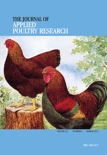
JOURNAL OF APPLIED POULTRY RESEARCH
Fostering innovation in poultry welfare and production.The Journal of Applied Poultry Research, published by Elsevier, stands as a pivotal resource in the field of poultry science. Established in 1992, this esteemed journal has transitioned to an Open Access model since 2020, fostering broader dissemination and accessibility of research findings. With an ISSN of 1056-6171 and an E-ISSN of 1537-0437, it is indexed in prominent databases, achieving a commendable Q2 ranking in the Animal Science and Zoology category as of 2023, placing it in the top 20% of journals in its field (Rank #91 out of 490, 81st percentile). The journal aims to advance the science and practice of poultry research, covering areas such as nutrition, genetics, management, and welfare. With editorial oversight that ensures rigorous peer review, the Journal of Applied Poultry Research is a vital platform that supports researchers, professionals, and students dedicated to enhancing poultry production and sustainability. Its commitment to high-quality research makes it an essential read for anyone involved in poultry science, agriculture, and related disciplines.
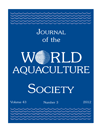
JOURNAL OF THE WORLD AQUACULTURE SOCIETY
Championing Sustainable Practices in Aquatic SciencesThe JOURNAL OF THE WORLD AQUACULTURE SOCIETY, published by WILEY, serves as a premier platform for researchers, practitioners, and academics in the thriving fields of aquaculture and aquatic sciences. With an ISSN of 0893-8849 and an E-ISSN of 1749-7345, this esteemed journal boasts an impressive ranking in Scopus, placing it in the Q1 quartile for both Agronomy and Crop Science and Aquatic Science. Recognized for its rigorous peer-review process and high-quality publications since its inception in 1986, the journal continues to play a vital role in disseminating cutting-edge research that addresses the complex challenges and opportunities within aquaculture practices globally. The journal's impact is underscored by its rank of #37 out of 247 within the category of Aquatic Science and #70 out of 406 in Agronomy in 2023, positioning it firmly in the top tier of scholarly journals. Researchers and professionals will find an invaluable resource in this journal, which not only aims to advance scientific knowledge but also fosters a community committed to sustainable aquatic development.
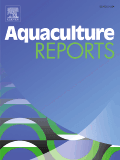
Aquaculture Reports
Championing Open Access to Aquatic Research InnovationsAquaculture Reports, published by Elsevier, is a prominent open-access journal dedicated to advancing knowledge in the fields of aquaculture, aquatic science, and animal science. Since its inception in 2015, this journal has quickly established itself as a leading platform for high-quality research, achieving a remarkable Q1 ranking in both Animal Science and Zoology and Aquatic Science as of 2023. With a Scopus ranking placing it in the top 7% of journals in Agricultural and Biological Sciences, Aquaculture Reports serves as an essential resource for researchers, professionals, and students alike, facilitating the exchange of innovative ideas and cutting-edge findings. The journal is indexed under ISSN 2352-5134 and is committed to fostering open access, ensuring that the latest research is readily available to the global scientific community. As it converges its years of publication from 2015 to 2024, Aquaculture Reports continues to shape the future of aquaculture research through rigorous peer-reviewed articles and impactful studies.

Journal of Livestock Science
Bridging gaps in livestock knowledge for global impact.Journal of Livestock Science, published by JOURNAL LIVESTOCK SCIENCE, is a prominent academic platform dedicated to advancing knowledge and research within the field of livestock science. With a focus on sustainable practices, animal health, and productivity enhancement, this journal provides valuable insights for researchers, practitioners, and students alike. Operating under an Open Access model, it ensures that critical findings and innovative methodologies are readily available to a global audience, fostering collaboration and development in the industry. Although it is relatively new in terms of established metrics such as an impact factor or HIndex, its commitment to high-quality peer-reviewed articles positions the Journal of Livestock Science as a significant player in the agricultural sciences arena. Published in Kota, India, it aims to bridge gaps in knowledge and elevate the discourse surrounding livestock management and science.
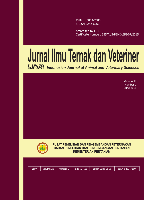
Jurnal Ilmu Ternak dan Veteriner
Transforming challenges into innovations in animal care.Jurnal Ilmu Ternak dan Veteriner, published by Pusat Penelitian dan Pengembangan Peternakan, is a leading Open Access journal based in Indonesia that has been providing a platform for groundbreaking research in the fields of animal science and veterinary medicine since its establishment. With its ISSN (0853-7380) and E-ISSN (2252-696X), this journal aims to disseminate high-quality research that addresses critical challenges and innovations in animal husbandry, veterinary practices, and related biological sciences. Recognized within the Q4 category in Animal Science and Zoology and the Q3 category in Veterinary (miscellaneous) as of 2023, it serves as an essential resource for researchers and practitioners looking to stay current with the advancements in these vital fields. The journal's commitment to providing Open Access content since 2011 ensures that cutting-edge findings are readily available to a global audience, fostering collaboration and progress in the animal sciences. With the Scopus ranking reflecting its niche position in the veterinary and agricultural sciences, Jurnal Ilmu Ternak dan Veteriner is poised to make a significant impact through 2024 and beyond.

Porcine Health Management
Transforming animal husbandry with cutting-edge insights.Porcine Health Management is an esteemed open-access journal published by BMC, focusing on the critical intersection of veterinary science and animal husbandry with a particular emphasis on swine health. Since its inception in 2015, the journal has established itself as a leading platform for disseminating cutting-edge research, earning a prominent position in the field with a 2023 category ranking of Q1 in Animal Science and Zoology, Food Animals, and Small Animals. With a strong impact factor indicative of its quality and relevance, the journal serves as an essential resource for researchers, practitioners, and students dedicated to advancing knowledge in swine health management. It is hosted in the United Kingdom and operates under transparent open-access guidelines, providing broad accessibility to vital research findings that drive innovation in animal health practices. As the field continues to evolve, Porcine Health Management remains at the forefront, contributing to the welfare and productivity of food animals.